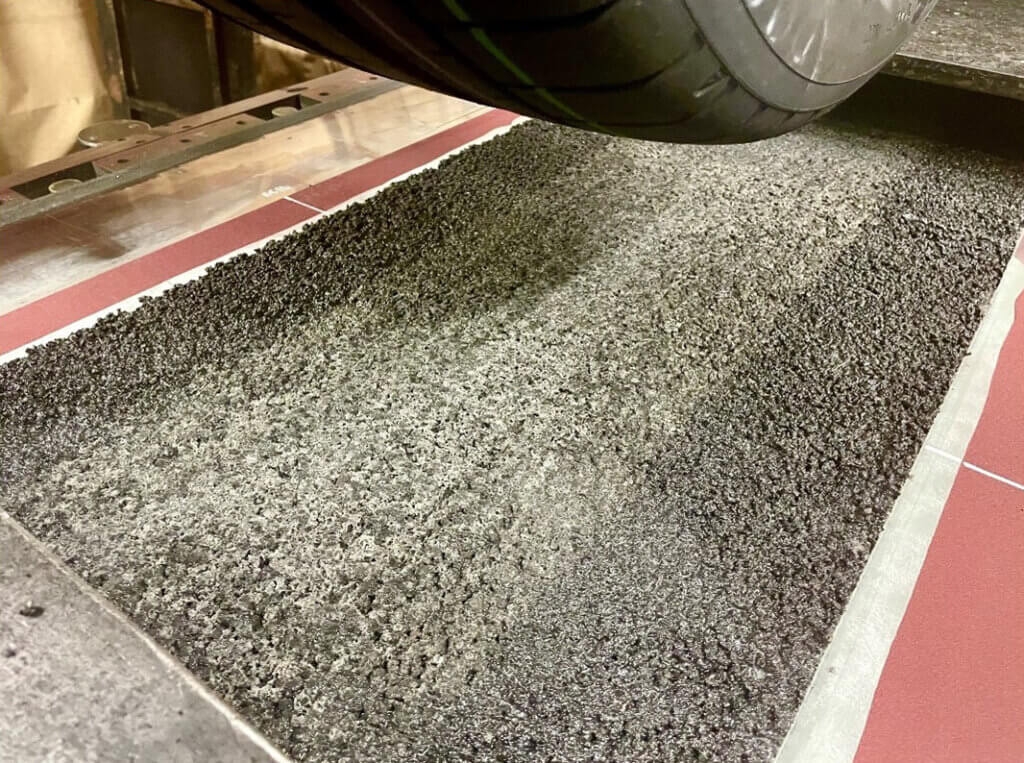Unparalleled tire testing center rolls forward
Asphaltant is a first-of-its-kind tire testing technology that replicates roadway conditions in a controlled environment.
Tire testing is stepping across a new threshold.
The Global Center for Automotive Performance Simulation has created a first-of-its-kind tire testing technology that replicates roadway conditions in a controlled environment. This tire testing technology, known as Asphaltant, is a custom surface that brings the asphalt texture of public roadways to an indoor testing machine.
“Indoor tire testing with Asphaltant offers unparalleled reliability compared to outdoor, on-road testing,” said Alex O’Neill, product and technical solutions manager at the center. “By using a realistic surface in conjunction with highly controlled environmental variables such as temperature, our new indoor testing capability ensures not just consistent and repeatable results, but very realistic results. This in turn leads to more accurate assessments of tire performance in the virtual world, leading to faster development times for both tires and vehicles.”
The center is a research-affiliated company of Virginia Tech and the Virginia Tech Transportation Institute that provides predictive modeling, simulation, testing, assessment, and scenario development to the mobility industry and other industry clients. Its researchers have conducted tire testing since 2012 and launched Asphaltant in late 2024.
While indoor tire testing is not a new method of tire evaluation, Asphaltant is a groundbreaking approach due to its use of stone aggregates to replicate outdoor driving surfaces as the primary material. Other tire testing machines utilize a sandpaper surface, which can be realistic as a first test but may lack the accuracy required for precise and highly accurate simulations.
O’Neill said Asphaltant is truly representative of what drivers feel on the road. The surface allows researchers to collect realistic data on tire traction, wear, and stability by using an indoor flat-trac machine to measure performance under different operating conditions. The Asphaltant surface is mounted to a metal belt that spins underneath a tire secured to the testing machine. The 14-ton machine can test tires at speeds of up to 200 mph with up to 10,000 Newton-meters of torque and forces of over 6,500 pounds. The flat-trac can also add water to represent driving in wet conditions.
The Global Center for Automotive Performance Simulation's proximity to the Virginia International Raceway in Alton has enabled partnerships in the racing community, which researchers leaned into during the creation of Asphaltant. It’s since been used to evaluate tires for various professional motorsports organizations, such as Formula 1 and NASCAR teams, and is producing information beneficial to all drivers and passengers.
“We work closely with client partners every day to solve their challenges,” said Frank Della Pia, the center's executive director. “Asphaltant was developed over many years internally. A few of our motorsports partners have been early adaptors, which has sped up the development. Our new approach to tire testing will yield incredible results for automakers, tire manufacturers, and people behind the wheel. We are excited to see our work being accepted as a viable way to improve the impact of tire models.”
Parties interested in learning more about Asphaltant or partnering with the center in other ways can contact Alex O’Neill.






